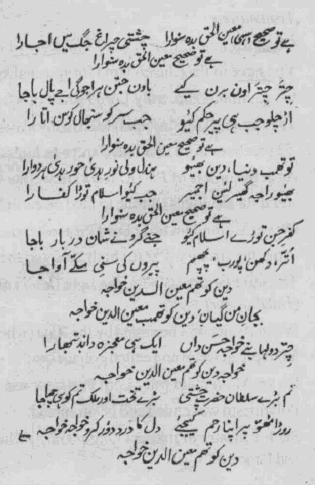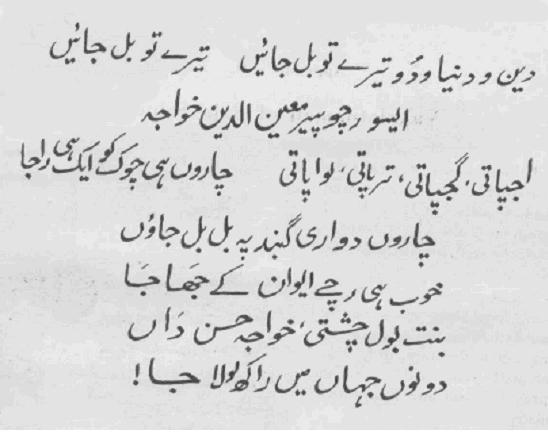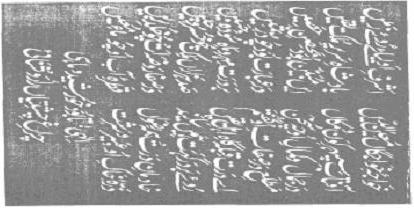Lineage, Relation & Association | Zaireen or Pilgrims | Moghul Documents | Nazrana (offerings) | Istitfa (Questionnaire) | Nazarana vis-a-vis the Khadims | Court verdicts | Patriotism | Rituals & Customary Practices |
About Us > > Rituals and Customary Practices:-
Rituals and Customary Practices at the Holy Shrine of Khwaja Gharib Nawaz (R.A.)
Undoubtedly, the Khuddam-e-Khwaja, who have been attached to the Shrine since its inception, played a key role in the smooth functioning and in keeping strict discipline in the performances of these rituals and ceremonies. As a result, they often invited the ill-will and wrath of pilgrims and other officials. But their genuine concern and enforcement of established customs and rituals, showing strict adherence to the humanitarian approach of the Saint, was always upheld by the authorities.
Daily Rituals
Three important rites are regularly performed every day per schedule: (i) Khidmat (service routine), twice a day; (ii) Roshni (lighting ceremony); (iii)Karka/Kadka (closing of the main doors of the Shrine)
Khidmat literally means service, which is the exclusive privilege of the Khadims. First, in the morning before dawn, the Baridar (who happens to be Khadim) of the day unlocks the silver plated main gate of the main Shrine. One of the elderly Khadims recites Azan (call for prayer), performs Taslim and Salam, and followed by some of the Khadims, enters the Shrine and closes the doors from inside. Some more candles are lit within the dome, and then again one of the pious and elderly Khadims moves closer to the inner circle of the Shrine, delicately removes the well-knitted floral garland called Sej from the Mazar (Shrine), and puts it in a large basket covered with cloth. Then they start sweeping flowers from both sides towards the foot end of the grave, where some of the waiting Khadims collect these flowers in huge Jhabs, and carry them out into a courtyard to be collected there. From there other Khadims take these flowers and distribute them among pilgrims and devotees. In between the sweeping of flowers from the Shrine, some of the Khadims standing outside the inner railings, assisted by long handle Chanwar and Farrashas, thoroughly clean the Shrine from all sides, leaving nothing on the lower circle. Then, led again by the same elderly Khadim, they all recite the Fatiha, thus invoking the blessings of the Almighty in the name of the great Saint, and place the cloth sheet in the usual manner. Then they put upon it a fresh floral Sej and sprinkle Attar. At the same time, one of the Khadims cleans the Shrine when the service of cleaning the Shrine over the doors are opened. Except Khadims of the Shrine no one is allowed to enter inside the Shrine precincts.
At about 3:00 P.M. the doors of the Shrine are again closed for the afternoon Khidmat and almost the whole process described above is repeated. On this occasion the upper part of the Mazar is pasted with Sandal, the Ghilaf is changed. The duty of Baridar Changes (every Khadim turn comes after 24 hours). This process lasts for about an hour.
In the period between the two services, pilgrims gather inside the Shrine to pay homage to the Saint, pray and recite the Fatiha, offer flowers and cloth sheets (Chadar) and invoke the blessings of the Almighty through Wasila of Khwaja Sahib.
Roshni literally means light, and refers to the ceremony of illuminating the Shrine at dusk with elaborate arrangements and a well-defined procedure. It is held daily in the evening, just before the maghrib prayer. The rituals followed in this ceremony may be summarized as follows: first, a plate/censer (agardani) containing aloe-scented sticks and small round pieces of aloe-wood (‘ud) is brought and placed by a Khadim in the middle of the (Western) outer railings of the Shrine. At the same time, four large candle-holders (shama dans) are also kept in a corner, nearly facing the agardani. Soon, four Khadims, one by one occupy the vacant place near these shama dans, facing the Shrine indicating that they have reserved the right to lift these shama dans on their heads for the coming ceremony. Outside the Shrine three other Khadims with candles in their hands, start walking one after another from a place near the langar khana where specially prepared candles are kept. As they start walking from this place, on their way to the shrine the drum beating begins at naubat khana. Slowly moving they pass by the pilgrims, standing in two rows, expecting to have these candles moved-and touched over their heads. Passing through the sandal khana mosque, these Khadims enter the shrine from its eastern door, and from the doorstep of the shrine they start reciting Persian verses in praise of Khwaja Sahib. In the shrine a huge crowd gathers, all male pilgrims being allowed to attend it.
|
Then the first Khadim who holds a single lit candle in his hand, lights the four candles of the shamadan, which are raised above their heads by the waiting Khadims. The first Khadim from the left then starts reciting Persian verses in praise of Gharib Nawaz after which the whole Shrine is illuminated. Persian verses are recited daily at dusk by a Khadim when the Roshni ceremony (candle lighting) is performed within the sanctum-sanctorum.
Roshni:- Translation: |
Karka is the term for the ceremony which is connected with the closing of the doors of the shrine for the night. It takes place generally between 9:30 and 10:30 p.m. Except the inner part of the first railings, the whole Shrine is cleansed by three Khadims. Pilgrims are not permitted to enter the shrine but are allowed to stand in the corridor of Beghmi Dalan (built by Princess Jehan Ara) in two rows, giving way to the Khadim who come out from the Shrine, one by one, at short intervals. They carry farrashas in their hands and touch them over the heads of the devotees while moving towards the sandal Khana mosque, where in a permanently fixed small dustbin they put all the flowers, dust etc. gathered from the shrine in a duster. When the Khadims are engaged in cleaning the floor of the shrine, outside in the courtyard, the groups (chauki) of musicians (qawwals) perform qawwalis.
As soon as the third and last Khadim comes out with the Farrasha (broom made up of peacock feathers) in his hand, the ghariyali (time keeper) loudly announces that six gharis (each ghari of a duration of 24 minutes in the medieval days) have passed.
The qawwals and all the people within the campus at once get up, and the qawwals start reciting karka verses in Bhojpuri and local dialect, composed by Roora Mithu, who was a musician during the reign of Jahangir. After that the doors of the shrine are closed, people perform taslim, and the ceremony comes to an end.
Karka is sung by the Hereditary qawwals of the shrine daily at night at the time of closing of the doors of Khwaja’s mazar (Shrine).
Karka means folklore (lokdhwani) or verse (pad) or cantos (charan). Its ragni (musical mode) is Gidara/Kidara and tal (musical measure) is jhap, in musical terminology, which is generally sung during moonlit nights.
It is called Karka and is sung, to motivate the devotees always to keep on the path of Truth. It is also the final or last ceremony of the day at the Shrine.
However, in one of the verses of Karka, Khwaja Moinuddin has been referred to as Khwaja Hassan Dan. Hassan being Khwaja’s real name, while Dan most probably appears to be his title (abbreviation of Dana i.e. ariff Gnostic or Dani/generous or indicates the abbreviated form of Danani, (person possessing divine wisdom) or of his full name Moinuddin, and also seems his nom-de-plum

|
Oh ye Moinuddin, truly Lord Protector who graces fortunes. |
Karka:-
Translation:
Besides these rituals, naubat is played twice a day, i.e. in the morning, and at sunset. Langar (a free meal consisting of soup of barley) is also prepared daily at the langar-khana and distributed twice (after Fajr and after Asr prayers) among the general public including pilgrims and the poor.
All the mundane rituals at the Mazar-e-Aqdas (Holy Shrine) are performed by Khuddam-e-Khwaja alone.
Urs :
Khwaja Gharib Nawaz (R.A.)’s Urs is celebrated every year in the first week of Rajab, on seeing the moon of Rajab, the seventh month of the Islamic calendar, drums are beaten to herald the commencement of the annual ceremony. The permanent Chauki (troupe) of qawwals arrive, and after Maghrib (sunset prayers) sit infront of the Shrine and sing the following verses:
“Bartui mehfil-shahana-mubarak-bashad
Saqia-badao-paimana mubarak bashad”
(Felicitation to thee for this blessed and majestic assembly; salutation, ‘Oh Saqi for your bountiful goblet of sacred wine).
And,
“Ilahi ta-abd-astana-i-yar-rahe
Yeh-asra-hai-gharibon-ka-barqarar rahe”
(Oh God, may this Shrine of the beloved exist till the last day, may this refuge of the poor remain forever!)
The word Urs has been derived from “UROOS” which means “ultimate meeting of an individual with God” it is said that Huzoor Gharib Nawaz (R.A.) spent last six days of his life in Seclusion in a cell and the 6th day of Rajab, his noble soul left the corporeal body. Every year Urs fair is celebrated on his death anniversary.
Although Urs held for the first six days of Rajab. Yet the 6th day is regarded to be the most special and auspicious. It is called “Chhati Sharif”. It is celebrated on the 6th Rajab between 10:00 A.M. to 1:30 P.M. Inside the Mazar Sharif Shijra is read by Khadims then Fariyad (Prayers) start for people present at the Dargah and for the country and its people for the peace and prosperity and also those who are not present but have sent Nazar-o-Niyaz to the Khadims to mark their presence for their welfare and for the promotion of brotherhood amongst them. Khadims tie small turbans on each others head and present Nazar (offerings in cash).
Just before the Qul (conclusion of 6th Rajab Chhati Sharif) Badahwa is sung at the main entrance of the Shrine by Qwwals which literally means a poem or verses in praise of Allah, His Holy Prophet (S.A.W.) or famous Sufis (Auliyas).
Badahwa is the only recitation which is accompanied by talis (clapping) only, and no other instrument is played. It was composed by Behlol Chishti, one of the ancestor of Khadims who again refers to Khwaja Moinuddin Chishty as Khwaja Hasan Dan. After its recitation, the ceremony of the Qul comes to an end and Fatiha is recited. The ceremony is marked closed by firing a cannon at 1:30 P.M. in afternoon.
 Both Universes (din-o duniya) be sacrificed,Badahwa:-
Both Universes (din-o duniya) be sacrificed,Badahwa:-
Translation:
At your Behest O! Khwajal
With Divine Attributes, O! Ye Pir Moinuddin
Lord of all Created beings : ajapati. gajpati, narpati, bhupati
(all earth, all animals and all mankind)
The sole Emir controlling the four corners (chowk) of the Universe.
I do rounds of thy four-walled (doored) dome in profound affection.
Oh! What ethereal splendour cascades from the balcony (jhajha)of thy abode
Poor petitioner Behlol Chishti pleads to Khwaja Hassan Dan
To protect and preserve his honour in this world as well as hereafter.
After this Khadim Hazrat distribute Tabarruk (Prasad) amongst the people present and post them for those who are not present, but have sent Nazar-o-Niyaz to the Khadims. The Mazar Sharif is washed by rose water by Khadims at night for six day from 1st Rajab to 6th Rajab during Urs period. On 9th Rajab at 9:00 A.M. the Mazar Sharif is washed with rose water by Khadims. Finally the Urs is marked closed.
These ceremonies are attended by members of all creeds, communities without the distinction of rank, region or religion and thereby subscribe to the ideals of universal love the Khwaja had preached and practised in his life time. This creates a sense of unity in that thinking which tends to break social and religious barriers and paves the way for emotional integration.
This system of Baridari/Kalidbardari settled the issue that only Khadims are the real custodians of the Mazar-e-Aqdas (Shrine) as they perform all rituals, and do Khidmat, kept the keys of the Shrine, open and close the Mazar, receive pilgrims and guide them in performance of Ziyarat as their Vakil and thus have sole right to collect all Nazar offered by them. It appears that the system of Haft Baridar is based on the Haft Chowki pattern of the Mughals, by which every important noble was given a day of the week to look after the place and patrol around it at night. Moreover, Baridari (Rota) system has also been prevalent in many famous Hindu temples of India, and is still in practice at the famous Vishnu Devi temple at Katra. It should also be kept in view that the Prophet of Islam, after the occupation of Makkah, did not disturb the prevailing practice of the key keeping (Baridari) and custodianship of Kaba which was held by a particular tribe (clan) of Quraish since time immemorial and was known as Hijaba or Sidana. The times of India dt. Wednesday 15, January 1997, Asanid-us-Sanadid, pp. 210-4, M.H. Haykal: The life of Muhammad: (tr Reprint, Delhi, 1976), pp. 407, 413. A short history of Aurangzeb’s Reign, op. cit; Mughal administration, op. cit.
Certainly it was due to the extra ordinary grass root work of our ancestors (Hereditary Khadims) who carried the mission of Khwaja Sahib at his Shrine, vigorously, against all odds, that we are still attached to the Shrine and are held in high esteem by pilgrims, duly respected and offered Nazar (offering).
People all over the world respect us (Khadims) because of our Nizbat to Huzoor Khwaja Gharib Nawaz (R.A.). Whatever we eat & wear whatsoever privilege we enjoy is a Sadqa of our Aaqa (master) Huzoor Khwaja Gharib Nawaz (R.A.)
‘Agar har-mui-tan gardad zubanam,
Adai shukr-i-o-ke-me-tavanam'.
If every hair of my body were given voice, yet I won’t be able to express my thanks for my Khwaja.
